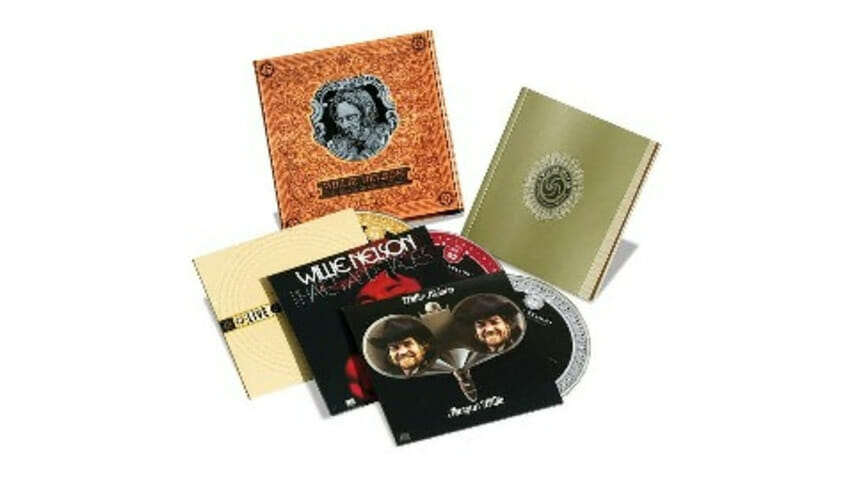
Willie’s crucial transitional works collected in one fine anthology
Willie Nelson only made two albums for Atlantic Records—Shotgun Willie and Phases and Stages—but both were absolutely crucial. It was the early ’70s, and Willie had just capped more than a decade in Nashville penning hits for other artists (“Crazy” for Patsy Cline, “Hello Walls” for Faron Young), and releasing a string of marginally successful Nashville-friendly albums of his own for Liberty, Buddah and RCA. But by 1971, Willie was bucking the Nashville establishment. He was in his late 30s and his slicked-back countrypolitan hairstyle had given way to a shaggier look. He’d just released the best album of his career, a conceptual meditation on aging called Yesterday’s Wine—easily comparable to Frank Sinatra’s great concept work September of My Years—but RCA, Willie’s label at the time, chose to ignore it. He and RCA soon decided the relationship was over.
This is where Willie was when the great Atlantic Records R&B producer Jerry Wexler met him at a party in Nashville. Willie was at work on another concept, Phases and Stages, about a broken relationship, and was trying out some of the songs on the partygoers. Wexler was starting a country-music division at Atlantic and liked what he heard. But their first project together was Shotgun Willie, another milestone for the songwriter and interpreter. That’s the album that kicks off this fine three-disc anthology documenting Willie Nelson’s transition from little-known Nashville maverick to American country-rock icon.
Having moved from Nashville to Austin in his home state of Texas, Willie set out to record a musical autobiography, using a mix of his own songs with material written by others, like Johnny Bush’s “Whiskey River” and Leon Russell’s “You Look Like the Devil,” which Willie made his own. Shotgun Willie begins with the horns-fueled title song, a witty window into the creative process he wrote in a motel on deadline. “Shotgun Willie sits around in his underwear / Biting the bullet and pulling out all of his hair,” he sings over a funky shuffle, and it’s immediately apparent he could never have gotten away with this in Nashville. The first 12 songs on disc one of The Complete Atlantic Recordings comprise the original album in all its glory. You can hear Willie in the process of developing his trademark phrasing on these songs, particularly on his gentle, aching version of another Leon Russell tune, “A Song for You.” You also can see Willie taking ordinary life details and making poetry of them, as he does in the post-breakup weeper “So Much to Do”: “My oatmeal tastes just like confetti / The coffee’s too strong so forget it / The toast is burning, well let it / There’s just so much to do since you’ve gone.”
As powerful as the Shotgun Willie disc is, Phases and Stages, on disc two, is even stronger. Phases, recorded with The Swampers of Muscle Shoals, Ala.—the guys who backed the likes of Aretha Franklin and Otis Redding—documents the devastation of a breakup equally from the points of view of the man and woman. No one who’s ever lost true love could listen to this cycle of songs, particularly the chilling “I Still Can’t Believe You’re Gone,” and not come away traumatized—it’s just that emotionally affecting.
The first five songs come from the woman’s perspective. Willie sensitively enters her psyche, and with his expressive phrasing he once again turns everyday details into poetry: “Washing the shirts and never complaining / Ironing and crying / Crying and ironing.” Phases is perhaps the most sensitive, intelligent set of songs ever written about the demise of a relationship. Simple lines contain complex human challenges (“Sister’s coming home / Mama’s gonna let her sleep the whole day long”). The songs’ focus shifts from her anger (“Pretend I Never Happened”) to his disbelief (“It’s Not Supposed to be That Way”), and finally to wide-eyed resignation (“Sometimes it’s heaven / Sometimes it’s hell / Sometimes I don’t even know”). The extras on disc two are similar versions of most of the songs, but recorded with Willie’s own band rather than the Muscle Shoals studio guys. While each alternate take is strong in its own right, they collectively underscore just how important it was to have this song cycle wrapped in the warm, gentle, bottom-heavy musical molasses of the Muscle Shoals Rhythm Section.
Disc three is just balls-out live Willie Nelson, recorded in 1974 at the Texas Opry House in Austin and produced by Wexler. It’s the template Willie has used in his live performances in the more than 30 years since. He includes his obligatory medley of hits (“Funny How Time Slips Away,” “Crazy” and “Night Life”) as well as now-time-tested crowd pleasers such as “Whiskey River,” “Stay All Night” and “Good Hearted Woman.” The final track is a delightfully spare, woozy, jazzy instrumental studio jam called “Willie’s After Hours,” which clocks in at just under 14 minutes.
Within a year after the release of Phases and Stages, Atlantic would close its country-music division and Willie Nelson would be on Columbia Records, releasing his third concept album in five years, the classic Red Headed Stranger. By then, Willie was already working with Waylon Jennings on their landmark Wanted! The Outlaws collection that fully captured the rock crowd and changed country music forever.